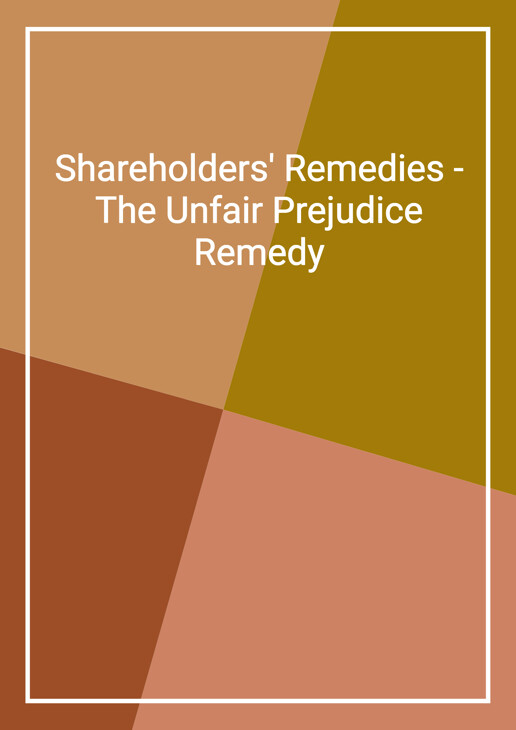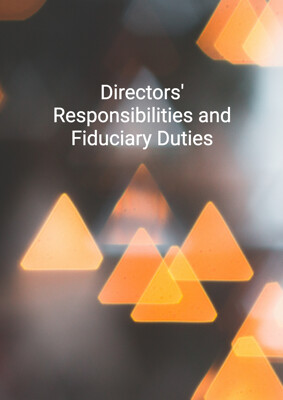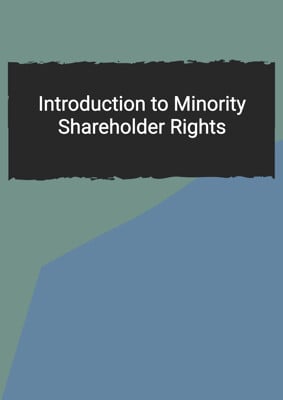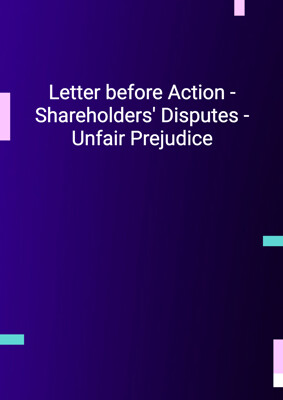How to Tailor the Document for Your Need?
01
Create Document
Click "Create Document" button and the document will be prepared with your account details automatically filled in.
02
Fill Information
Please fill in any additional information by following the step-by-step guide on the left hand side of the preview document and click the "Next" button.
03
Get Document
When you are done, click the "Get Document" button and you can download the document in Word or PDF format.
04
Review Document
Please review the document carefully and make any final modifications to ensure that the details are correct before publication / distribution.
Document Preview
Document Description
The document titled 'Shareholders' Remedies - The Unfair Prejudice Remedy' discusses the importance of the unfair prejudice remedy as a weapon for minority shareholders in commonwealth countries such as the UK and Hong Kong. The remedy is provided under section 994 of the UK Companies Act 2006 and section 724 of the Hong Kong Companies Ordinance. The document begins by explaining that the unfair prejudice remedy allows a member of a company to petition the court when their interests have been unfairly prejudiced. The most common relief sought through this remedy is a share buyout.
The concept of 'unfair prejudice' is crucial to understanding the statutory remedy. It is important to note that unfairness and prejudice are distinct concepts, and both must be established to obtain relief. Unfairness is not limited to financial loss and can be shown by the infringement of the petitioning member's rights. The determination of unfairness is based on traditional equitable principles rather than subjective notions of fairness.
The document then provides a detailed case study to illustrate the application of the unfair prejudice remedy. The case involves a building construction company where a minority shareholder and employee, the petitioner, claimed unfair prejudice due to broken promises regarding profit-sharing and share allotment. The court ultimately held that there was no unfair prejudice as there was no breach of an agreement or understanding.
The document also explores the principled approach to the concept of 'unfairness' as explained by Lord Hoffman. It emphasizes the contractual nature of the basis for granting relief and the role of equitable considerations in restraining the exercise of strict legal rights.
From a Hong Kong perspective, the document discusses a case involving a family company and the application of the unfair prejudice remedy. The court held that the BVI parent company had a sufficient connection with Hong Kong, allowing for the exercise of the winding-up jurisdiction on just and equitable grounds. The court also adopted the O'Neill test for equitable considerations, which may arise from mutual understandings or accepted courses of conduct between parties.
In summary, the document highlights the importance of the unfair prejudice remedy as a means to protect minority shareholders in commonwealth countries. It provides detailed explanations of the concept of unfair prejudice, the application of the remedy through a case study, and the principled approach to determining unfairness. The document also explores the Hong Kong perspective on the remedy and the role of equitable considerations.
How to use this document?
1. Understand the purpose: The unfair prejudice remedy is a statutory weapon available to minority shareholders in commonwealth countries. It allows them to petition the court when their interests have been unfairly prejudiced.
2. Establish unfairness and prejudice: To obtain relief, both unfairness and prejudice must be established. Unfairness is not limited to financial loss and can be shown by the infringement of the petitioning member's rights.
3. Familiarize with the case study: The document provides a detailed case study involving a building construction company. It illustrates the application of the unfair prejudice remedy and the factors considered by the court.
4. Consider contractual basis: The basis for granting relief is fundamentally contractual. Determine if there has been a breach of the articles or shareholders' agreement, or a breach of directors' duties.
5. Understand equitable considerations: Equitable considerations may come into play to restrain the exercise of strict legal rights. Unfairness can arise from a breach of the rules or using the rules in a manner contrary to good faith.
6. Explore the Hong Kong perspective: The document discusses a case involving a family company in Hong Kong. Understand the jurisdiction and requirements for exercising the unfair prejudice remedy.
7. Apply the O'Neill test: Equitable considerations can be assessed using the O'Neill test, which considers mutual understandings or accepted courses of conduct between parties.
8. Analyze the facts: Consider the intentions and understandings between the parties involved in the case study. Assess whether the exclusion or actions amount to unfair prejudice.
9. Seek legal advice: If you believe your interests as a minority shareholder have been unfairly prejudiced, consult with a legal professional to understand your rights and options.
10. Be prepared for potential outcomes: Understand that the court's decision will depend on the specific circumstances of your case. Be prepared for various outcomes, including the possibility of relief or the denial of your petition.
Not the right document?
Don’t worry, we have thousands of documents for you to choose from:







